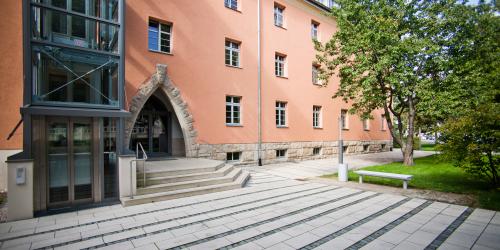
City council adopts budget
At its meeting yesterday, the city council approved the budget for 2025 and 2026. With a total volume of 468.3 million euros for 2025 and a large number of consolidation measures, the legal requirements for an approvable budget were met. This is an important step towards preserving the City of Jena's financial capacity to act even in economically challenging times.
Where do the funds come from and what are they used for?
The budget plan shows how the City of Jena's financial resources are distributed. In 2025, the budget is made up as follows:
Revenue:
- Taxes: € 172.6 million
- Federal and state grants: € 216.9 million
- Service charges: € 16.5 million
- Reimbursements: € 28.0 million
- Other income: € 11.2 million
- Total income: € 445.2 million
Expenditure:
- Citizen services, security and order: € 54.0 million
- Education and youth: € 163.1 million
- Social affairs and health: € 141.1 million
- Culture and leisure: € 25.2 million
- Infrastructure, mobility and environment: €45.9 million
- Urban development and housing: € 21.9 million
- Central services: € 17.1 million
- Total expenditure: € 468.3 million
The revenue of € 445.2 million is offset by expenditure of € 468.3 million. The difference can be covered by surpluses from previous years. The budget is therefore not balanced, but can still be approved.
Significance of an approvable budget
An approvable budget ensures financial stability and the ability to invest in important future projects. This is particularly important in times of high cost increases and uncertain economic prospects. The present double budget creates planning security and enables the city to maintain its high level of performance without making cuts in the areas of culture, social affairs or voluntary services.
Lord Mayor Dr. Thomas Nitzsche emphasizes the importance of the adopted budget:
"We had to make many adjustments in order to arrive at an approvable budget in challenging times. It was particularly important to us that we continue to live up to our responsibility in terms of voluntary services, culture and the social sector, while at the same time further strengthening Jena's position as a business and science location."
Mayor and acting Head of Finance Christian Gerlitz adds:
"With this budget, we are sending a clear signal: we are sticking to our investment projects and maintaining our city's high level of performance. We have succeeded in planning for the future in uncertain times and, unlike the state and federal government, have already created clarity for 2025 and secured stability in the structures. I would like to thank the city council for the great trust it has placed in the work of the city administration, which is evident in the broad support for the administration's draft budget. My sincere thanks also go to my colleagues in the financial administration who have worked day and night in recent weeks to present the budget before the end of the year."
Measures that lead to an approvable budget
In order to make the budget approvable, extensive consolidation was necessary, which was achieved thanks to intensive discussions with all of the city's own companies and the specialist departments of the administration.
"Every department in the administration has made its contribution to achieving the common goal of an approvable budget. At the same time, we are investing over 110 million euros in building construction and civil engineering in the 2025/26 double budget, thereby continuing our consistent investment path in cycle paths, streetcars and road construction, as well as school construction and daycare center renovations,"
emphasizes Finance Director Gerlitz.
The decision on the property tax rates provides for the tax burden to be distributed as fairly and socially acceptable as possible. The assessment rate for property tax B will be drastically reduced by 95 points to 400 points. This means that the property tax reform in Jena is revenue-neutral. Nevertheless, the tax burden will shift to a certain extent from non-residential properties to residential properties. This is not due to the city's decision, but to the correction of the development of property values over many years that has now been made by the federal legislator.
At the same time, the city of Jena is investing in the business location. This also includes keeping the trade tax constant. Support for JenaKultur and subsidies to Stadtwerke Jena GmbH and the business development agency also remain an integral part of financial planning.
Future prospects
The city expects that smart investments and maintaining a stable level of performance will enable positive economic development. Even if the financial scope is currently limited, the double budget provides a reliable basis for successfully shaping the coming years.
